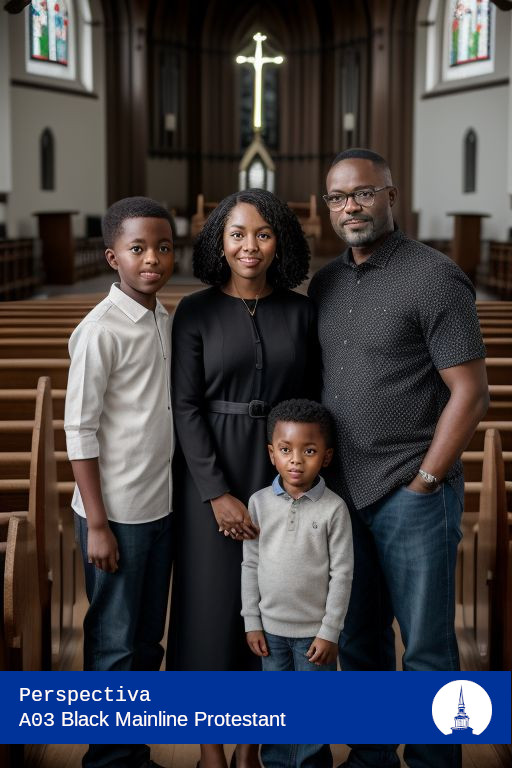Features of the Black Mainline Protestant Lifeway:
A03 Black Mainline Protestant
African Americans who belong to established Protestant denominations that are traditionally associated with mainstream society and influence.
Black Mainline Protestantism in the United States is a distinct subset of Mainline Protestantism characterized by its historical significance, unique cultural expressions, and contributions to both the religious and social landscapes of the nation. At its core, Black Mainline Protestantism represents the historically Black Mainline Protestant denominations, including the African Methodist Episcopal Church, the Progressive National Baptist Convention, the United Holy Church of America, and others. Black congregants have been part of these traditions for centuries, and their presence has enriched the diversity and inclusivity of American Protestantism.

Deep Historical Roots
Black Mainline Protestantism has deep historical roots, dating back to the period of slavery and the early days of African American Christianity. During the antebellum era, enslaved Black individuals often worshiped alongside their white masters in Mainline Protestant churches, though in segregated seating. After emancipation, many Black congregations remained affiliated with these denominations, while others founded independent Black churches, often referred to as "mother" or "sister" churches.
Cultural Worship Style
One of the defining features of Black Mainline Protestantism is its unique cultural expressions within worship. Gospel music, characterized by its vibrant and emotive singing, emerged from these churches and has had a profound influence on American music and culture. The use of call-and-response, spirited sermons, and a focus on communal worship experiences are hallmarks of Black Mainline Protestant services.
Social Activism and Advocacy
Social activism and advocacy for civil rights have been integral to Black Mainline Protestantism throughout its history. Black clergy and congregants have played pivotal roles in the civil rights movement, advocating for racial equality, justice, and desegregation. Prominent leaders like Martin Luther King Jr. and Fannie Lou Hamer emerged from this tradition, emphasizing the moral imperative of racial and social justice as rooted in their faith. Despite facing challenges, such as declines in membership and financial resources, Black Mainline Protestant congregations continue to provide spiritual guidance and community support to their members. They remain committed to addressing contemporary social issues, including racial justice, economic inequality, and education.
Summary
In summary, Black Mainline Protestantism in the United States represents a historically rich and culturally significant subset of Mainline Protestantism. Its unique contributions to American Christianity, music, and social justice continue to influence the nation's religious and social landscapes.

| TOP TEN BASIC TRADE AREAS | |
| 1 | Atlanta, GA |
| 2 | New York, NY |
| 3 | Chicago, IL |
| 4 | Memphis, TN |
| 5 | Detroit, MI |
| 6 | Washington, DC |
| 7 | Dallas-Fort Worth, TX |
| 8 | Los Angeles, CA |
| 9 | Houston, TX |
| 10 | Philadelphia, PA-Wilmington, DE-Trenton, NJ |
